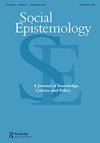Lessons from Reckwitz and Rosa: Towards a Constructive Dialogue between Critical Analytics and Critical Theory
IF 2
2区 哲学
Q1 HISTORY & PHILOSOPHY OF SCIENCE
引用次数: 1
Abstract
ABSTRACT It is hard to overstate the growing impact of the works of Andreas Reckwitz and Hartmut Rosa on contemporary social theory. Given the quality and originality of their intellectual contributions, it is no accident that they can be regarded as two towering figures of contemporary German social theory. The far-reaching significance of their respective approaches is reflected not only in their numerous publications but also in the fast-evolving secondary literature engaging with their writings. All of this should be reason enough to take note of their collaborative work, which, most recently, has culminated in the publication of their co-authored book Spätmoderne in der Krise: Was leistet die Gesellschaftstheorie? (Berlin: Suhrkamp, 2021). The main purpose of this paper is to demonstrate that the latest exchange between Reckwitz and Rosa contains valuable insights into recent and ongoing trends in society in general and social theory in particular. The first part comprises an outline of the central matters at stake in, and the core lessons learnt from, the constructive dialogue between Reckwitz’s critical analytics and Rosa’s critical theory, before moving, in the second part, to an assessment of the most significant limitations of their respective views and propositions.雷克维茨和罗莎的经验教训:走向批判性分析与批判性理论的建设性对话
安德烈亚斯·雷克维茨和哈特穆特·罗莎的作品对当代社会理论的影响越来越大,怎么说都不为过。鉴于他们智力贡献的质量和独创性,他们被视为当代德国社会理论的两位杰出人物并非偶然。他们各自方法的深远意义不仅反映在他们众多的出版物中,而且反映在与他们的著作相关的快速发展的二手文献中。所有这些都应该足以让我们注意到他们的合作工作,最近,他们共同撰写的书Spätmoderne在der Krise的出版达到了高潮:leistet die Gesellschaftstheorie?(柏林:Suhrkamp, 2021)。本文的主要目的是证明Reckwitz和Rosa之间的最新交流包含了对一般社会和社会理论中最近和正在进行的趋势的有价值的见解。第一部分概述了雷克维茨的批判分析和罗莎的批判理论之间的建设性对话所涉及的核心问题,并从中吸取了核心教训,然后在第二部分对他们各自观点和命题的最重要局限性进行了评估。
本文章由计算机程序翻译,如有差异,请以英文原文为准。
求助全文
约1分钟内获得全文
求助全文
来源期刊

Social Epistemology
Multiple-
CiteScore
2.60
自引率
17.60%
发文量
60
期刊介绍:
Social Epistemology provides a forum for philosophical and social scientific enquiry that incorporates the work of scholars from a variety of disciplines who share a concern with the production, assessment and validation of knowledge. The journal covers both empirical research into the origination and transmission of knowledge and normative considerations which arise as such research is implemented, serving as a guide for directing contemporary knowledge enterprises. Social Epistemology publishes "exchanges" which are the collective product of several contributors and take the form of critical syntheses, open peer commentaries interviews, applications, provocations, reviews and responses
 求助内容:
求助内容: 应助结果提醒方式:
应助结果提醒方式:


